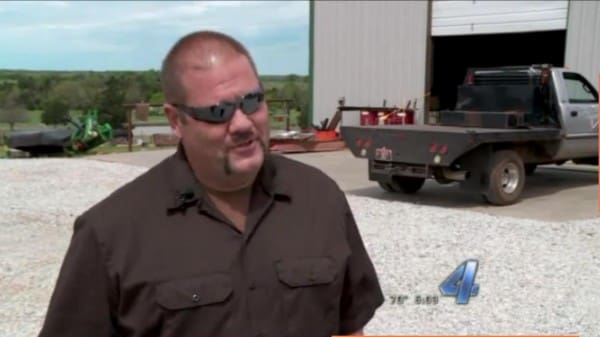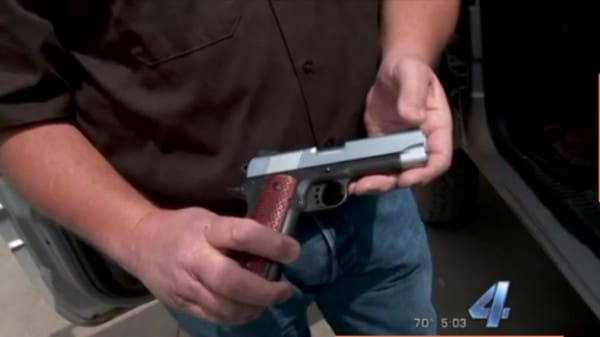In rural Pottawotamie county in Oklahoma, the Sheriff appreciates the efforts of armed citizens. I was able to get in touch with the elder Alvin Cleere. His son had captured a burglar by being observant. The son, also named Alvin, had noticed a pickup truck at a property were it did not belong. He checked things out and found that the truck was loaded with stolen goods. From kfor.com . . .
He discovered the truck was loaded with stolen property, mattresses, fixtures even a kitchen sink. His fed up crime fighter pulled the 45 from his pickup.
Alvin held the alleged thief until deputies arrived.
Authorities applaud his bravery and willingness to get involved.
Alvin’s father said that he was very proud of his son, and gave me a phone number to contact him. I was interested because the story mentioned that this was the second time in a few weeks where an armed Alvin Cleere had helped to capture criminals.
In both break-ins, the suspects were wanted on outstanding warrants. I did some searching, but was unable to come up with the first instance in which Alvin used a gun to capture a wanted man in the commission of a crime. It was said to be a home invasion.
When I contacted Alvin, he immediately explained why I could not find the incident on the Internet. It was because no story had been written about it. He only did the interview for the second incident because the sheriff had asked him to do so, as a crime fighting measure.
That was good strategy on the part of the sheriff. Alvin did not wish to talk to me further, but I was glad to learn that the sheriff understands the deterrent effect of armed citizens.
This story illustrates that a great many incidents of the defensive uses of firearms are never reported in the media. In this case we have a home invasion that was investigated by the Sheriff. An armed citizen used a firearm to stop the crime and capture a criminal that was wanted on a warrant. Yet no story was written in the media.
Surprisingly, it’s not his first citizen’s arrest. A few weeks ago, he interrupted another home invasion and captured a wanted felon.
In a rural environment, there are few media outlets. Wonderful stories can go unreported, simply because no reporter is willing to travel to where the story is. People who use firearms to stop crimes are often reluctant to lose their privacy.
It is obvious that Alvin’s .45 was not purchased on the spur of the moment. It looks to be a semi-custom pistol, or at least of very high quality. It makes one wonder if Alvin has a concealed carry permit, was in the military, or has shot competition.
In both of these cases, no one was killed or shot. The case thus becomes one of the vast majority of defensive gun uses where no shots are fired. I called the sheriff office to see if I could find out more details about the first incident. I have not received any return calls at this time.
c2015 by Dean Weingarten: Permission to share is granted when this notice is included. Link to Gun Watch
About Dean Weingarten;
Dean Weingarten has been a peace officer, a military officer, was on the University of Wisconsin Pistol Team for four years, and was first certified to teach firearms safety in 1973. He taught the Arizona concealed carry course for fifteen years until the goal of constitutional carry was attained. He has degrees in meteorology and mining engineering, and recently retired from the Department of Defense after a 30 year career in Army Research, Development, Testing, and Evaluation.






It’s a being a criminal in Oklahoma is a hazardous occupation.
Heard this on Cam& Company…good job!
Perhaps OSHA will intervene and make the working conditions for criminals safer? After all is it dangerous for a “working” criminal these days in some states. And safer in other states.
So, the truck with stolen property may or may not have had everything, but it did have a kitchen sink.
A stolen mattress???
Yecchhh!
In Connecticut he would lose his permit and sit in jail for ten years. In Florida the dispatcher would tell him “we don’t need you to do that…..”
Clay
“In a rural environment, there are few media outlets. Wonderful stories can go unreported, simply because no reporter is willing to travel to where the story is. People who use firearms to stop crimes are often reluctant to lose their privacy.”
I’m frustrated by the “data deniers” who refuse to acknowledge the incidents of DGUs. Whether there are 100,000 or 2.5 million DGUs per year, deniers claim such incidents are de minimus. Admittedly, there is no GOOD way for academic researchers to nail-down data of this character.
Nevertheless, we PotG ought to recognize that there is a rhetorical issue to deal with here. Unless data is published with the imprimatur of a government agency it will be dismissed by the Antis.
I wonder if it would be worth-while to push for DGU-reporting legislation at the Federal level, and at as many State and municipal levels where we could expect a receptive audience. I see such an initiative primarily as a rhetorical response to the data-deniers. Here is the argument.
The Anti’s claim that DGUs don’t occur; or, that those that do occur don’t justify the loss of life from criminal, suicide or accidental gun uses. DGUs are important data to resolve the empirical question. Quite apart from the Constitutional and ethical considerations, we ought to better understand the data around vital statistics in order to tailor public policies – whatever policies might be suggested by the data.
The FBI already collects crime data voluntarily submitted by State and municipal agencies; most such agencies participate. Piggybacking a new category of reporting shouldn’t be a great additional expense; only a marginal addition to the existing infrastructure.
Each State is intrinsically empowered to compel reporting by its direct agencies and municipalities. Each municipality could voluntarily accumulate and report its own data. It’s important to recognize here that we would need only a few hundred municipalities voluntarily publishing data to enable statistically-significant extrapolations across the nation. A few thousand contributing municipalities would probably suffice to make extrapolations at the 90 – 95% confidence level.
We know that there are at least some sheriffs and some police chiefs that publicly acknowledge the value of DGUs; e.g., the sheriff of Milwaukee County and Detroit’s police chief. There must be hundreds, if not thousands, more sheriffs/chiefs. Might these sheriffs/chiefs be persuaded to initiate reporting voluntarily?
Once a few sheriffs/chiefs in a given State, e.g., Wisconsin or Michigan, began reporting voluntarily, the legislatures of such States would be inclined to consider a State-wide program; first as a pilot and then a mandatory program. Arguably, if the number of DGUs in a precinct are negligible the cost of tabulating and reporting 0/1/2/3 incidents will be no meaningful burden on those cash-strapped municipalities. Conversely, if the number of DGUs in a precinct is large then the information value of such data would vastly exceed the cost of extracting it from the police incident reports (which are prepared in any event).
Assuming growing success at the municipal (voluntary) and State (mandatory) levels, eventually Congress could be compelled to mandate FBI collection and coalition of the available data, reducing the burden on private researchers contacting individual municipal or State agencies.
Perhaps John Lott’s Crime Prevention Research Center would provide the expertise to design a reporting template and a central repository for municipal/State agencies to report to. For such an initiative to succeed it would be important to design a uniform template for DGU reporting. For example, we would need to know whether an incident occurred inside/outside the home; the sex of the defender; whether other vulnerable people (children, elderly) were defended; whether a gun was discharged; whether 1+ shots hit/missed the perpetrator or hit innocent bystanders; and the like. Data on hit/missed/bystander incidents would be critical for cross-tabulating vs. State’s mandatory training requirements. Do civilians have better “scores” in States with high/medium/low/zero training mandates?
Let’s suppose that this is a very good idea and – precisely for that reason – it will be STOPPED by the Antis. Such a result might be just as useful – if not more-so – than a successful implementation! Our (PotG) prominent spokesmen – especially in legislative chambers – can use our opponents resistance to bludgeon them for denying the phenomena of DGUs. They can’t on the one hand deny the statistical significance of thousands of (local) newspaper reports and yet oppose a formal tabulation program for such vital statistics. Either legislators:
– support and defend the 2A on the principle of self-defense; or,
– gather the public-safety data that they claim (without empirical support) justifies gun-control.
MarkPA,
I would love to have accurate data on how often someone uses a firearm to defend themselves. However, MANY people will never report such events because they want to remain anonymous, they don’t trust the police, they were on shaky legal ground (e.g. felon in possession of a firearm), etc. For that reason alone, we will never have anything close to accurate data.
More importantly, I do not believe it is a good strategy to argue for our right to keep and bear arms based on data. First of all, gun grabbers can challenge the accuracy of the data ad infinitum. Second, gun grabbers can argue the “usefulness exceeds detriment” threshold ad infinitum.
Rather, we simply have to assert our right based on nothing more than the fact that it is our right. It needs no justification nor for others to embrace it. I establish this right up front with gun grabbers. And to drive the point home, I ask them a parallel example: if you lived on an island with several other people, how many people on that island have to demand that you must never speak before you must give up your right to speak?
I believe a sense of the data can illustrate the utility of being armed … and that may attract people to our side. Beyond that, it cannot be the linchpin of our position.
My feeling is fewer laws are better than more. So no, no law to report DGU.
So, we should create yet another taxpayer funded government database that will be seriously mis-reported only to be ultimately ignored by the anti’s? The good guys doing good things know who they are…good on them and I’m proud of ’em. But let’s not burden them with unwanted attention and all the unwanted crap that is going to accompany getting more of the “government” involved.
Looks like an EMP or a Kimber.
Comments are closed.